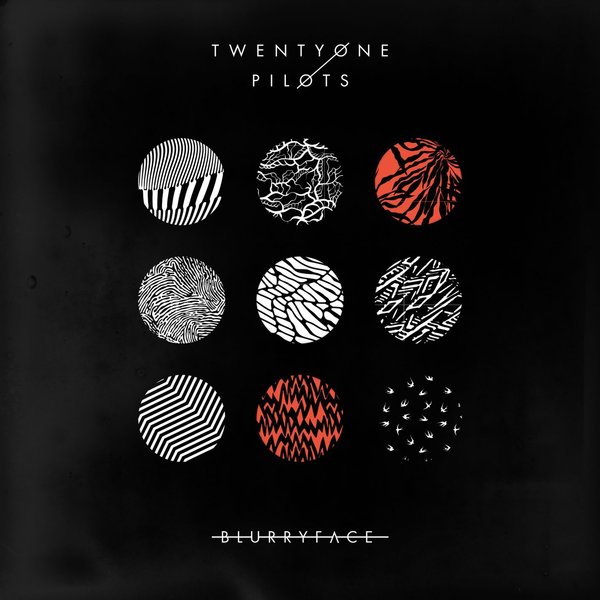
In mid-May, Columbus-based duo Twenty One Pilots released their highly anticipated fourth studio album, Blurryface. It diverges in sound and message from 2013’s Vessel, which marked the pair’s record-label debut on Fueled by Ramen, and reflects the experiences of lead singer Tyler Joseph and drummer Josh Dun in their ascendance from selling tickets to local shows in a Chick-Fil-A food court to selling out venues internationally.
The album plays almost like a concept album to which Dun and Joseph were afraid of fully committing. “Blurryface,” a character intended to embody Joseph’s insecurities, and the namesake of the album, makes a personal appearance on two of its 14 tracks. The presence of Blurryface is signified by an altered, deeper version of Joseph’s voice that has a pretty odd, and not entirely pleasing sound. It doesn’t add much to the album either, especially because it’s only included on two songs. In Fairly Local and Stressed Out, the Blurryface voice echoes a rap verse done in Joseph’s normal voice, and both of the songs would be better without the Blurryface portions.
The idea of Blurryface, however, seems like a natural progression from Vessel in terms of its message. If Vessel encouraged listeners to push through their insecurities and “stay alive,” then Blurryface challenges them to fight to overcome negativity and fears. It does so through tracks that seem to follow a storyline of Joseph’s personal experiences. “Heavydirtysoul” (“Can you save my heavydirtysoul? / for me”) and “Goner” (“I’ve got two faces, blurry’s the one I’m not / I need your help to take him out”) bookend the album wonderfully, as Joseph seems to be reaching out to the listener throughout the album for guidance in overcoming his self-doubt. In general, the track ordering supports a story of a continuous struggle against Blurryface that sometimes results in triumph, but never really ends – a depiction that intimately parallels reality. “The Judge,” which denotes the halfway point of the album, marks a decisive moment in the tone of the story, as Joseph begins to question his relationship with his insecurities (“I don’t know if this song is a surrender or a revel, / I don’t know if this one is about me or the devil”). From that point, the conflict between Jopseh and Blurryface intensifies, and the outcome is ultimately left uncertain as Joseph implores the listener to help him continue his fight in “Goner.”
In terms of sound, however, Blurryface doesn’t flow nearly as well as Vessel when listened to in its entirety. For a band that stresses the importance of albums over singles, this is a major flaw. To be sure, there are great songs on the album, but the sound is less clean overall. This could be because Joseph and Dun opted to use a number of producers, based on what each song “needed,” according to a Fueled by Ramen press release. In contrast, all of Vessel was produced by multiple Grammy-nominee Greg Wells. Whatever the reason, the songs don’t fit together quite as well as they did on Vessel. While both records in some ways defy the laws of genre, jumping between alternative, rap, and pop, every song on Vessel somehow maintained a shared identity. Joseph and Dun failed to replicate that effect on Blurryface. “We Don’t Believe What’s on TV” and “Polarize,” for instance, sound like they could have been created by two separate bands. That’s not to say it’s bad for the duo to merge and bounce among different sounds – in fact, that’s one of the factors that makes Twenty One Pilots’s music so interesting. However, it was their ability to do that while still sounding uniquely like themselves that made Vessel such a phenomenal work.
Blurryface is full of exploration of and experimentation with new ideas. Some of them work, and others do not. Overall, while it doesn’t surpass the high bar set by Vessel, it contains a powerful message, and has opened a new phase in the band’s career. I’m excited to see where it takes them.









